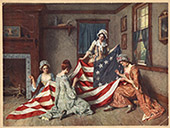Libraries, University of Nebraska-Lincoln
ORCID IDs
Document Type
Archival Material
Date of this Version
1-10-1848
Abstract
Henry Highland Garnet’s 1848 address to the Female Benevolent Society of Troy, New York, published that year, is an eloquent survey and reclaiming for the race of its share in the Western intellectual tradition. That the ancient Egyptians were Africans, that the Song of Solomon was addressed to an African woman, that the Ethiopians warriors were celebrated by Homer, that Moses’ wife was Ethiopian, that Hannibal, Terence, Euclid, Cyprian, Origen, and Augustine all were of African ancestry— these facts are adduced by Garnet to suggest both the heritage and the potential achievements of the Africans in America. Garnet surveys the origin and histoy of the slave trade, and especially the late events surrounding its abolition and the end of slavery in the British empire, Mexico, Haiti, and the possessions of France and Sweden. He describes the horrors of slavery in America, the heroism of Cinque and the Armistad affair, and the martyrdom of the Cuban poet Placido. He challenges his own people to eschew the debates over whether to call themselves “Africans,” “colored,” “African-American,” or “black”; and to pursue education instead of showy and expensive pageants and demonstrations. He reviews the late annexation of Texas, and the increase in slave territory produced by the Mexican War. He describes a destiny in which the so-called races are blended— “This western world is destined to be filled with a mixed race.”—and he opposes colonization, out of patriotic attachment—“America is my home, my country, and I have no other. I love whatever of good there may be in her institutions. I hate her sins. I loathe her slavery, and I pray Heaven that ere long she may wash away her guilt in tears of repentance.”
Garnet’s was an important early and radical voice in the black antislavery movement, and this address was made at an especially critical moment both in his career and in the nation’s careening slide towards secession and war.



Comments
"A DISCOURSE DELIVERED AT THE FIFTEENTH ANNIVERSARY OF THE FEMALE BENEVOLENT SOCIETY OF TROY, N. Y., FEB. 14, 1848." This electronic text is based on the edition published in 1848.